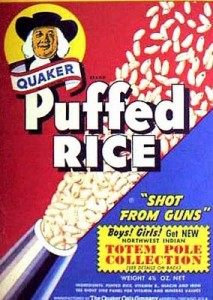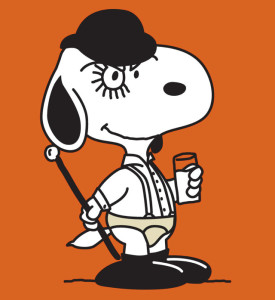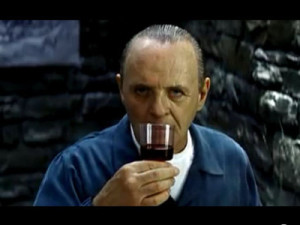Classical music in Popular Culture—not always fair
Many of us have been introduced to classical music via popular media, which includes movies, television and radio programs, as well as the commercial announcement contained therein. As a youngster, I remember well the Warner Bros. cartoons, such as “The Rabbit of Seville,” and the famous Bugs Bunny cartoon where is a conductor (much to the dismay of his neighbor, the opera singer) and is presented as a caricature of Leopold Stokowski (as he walks to the podium, you hear people whisper “It’s Leopold!”).
I remember well, the classical music contained in television commercials, especially the commercials for Quaker Puffed Wheat and Puffed Rice. The Tchaikovsky “1812” overture was played and when announcer would announce that they were the cereals “Shot from Guns!” At that point, the cannon would fire (timed to the music, of course) and tons of cereal was released from the barrel. Nowadays, I am sure that company would be sued for false advertising for such a blatant fabrication. Those were gentler times, I suppose.
Another piece that one heard regularly was Ponchielli’s “Dance of the Hours,” from his opera “La Gioconda.” Not only as the melody to Allen Sherman’s “Hello Muddah, Hello Faddah,” but in numerous commercials, often for pet food showing an over exuberant (and perhaps underfed) puppy running and sliding to the bowl of dog food.
The list goes on, and many composers’ music was used to such effect. I think that of all the classical music I have heard in the popular media, Bach stands out. I have heard Bach’s music in commercials more times than I can count. It seems whenever there is a character in a TV show or movie who is a ‘cello player, we hear music from the Suites for Unaccompanied ‘Cello. A recent MetLife commercial, shows “Schroeder” from the “Peanuts” comic strip on stage, playing Bach’s “Italian Concerto.” Of course, any long-time reader of “Peanuts” would know that Schroeder worshipped Beethoven. For accuracy sake, he should have been playing the “Waldstein” sonata, or something else by old Ludwig Van.
Most of the associations are entertaining, and certainly harmless, but sometimes a bit distressing, at least for me. Thinking of old “Ludwig Van,” calls to mind Anthony Burgess’s novel (and of course the movie) “A Clockwork Orange” and the association with classical music for the main character, who was a true sociopath. I was a bit bothered by the fact that Beethoven’s music seemed to bring out the beast in him. I know—just a movie.
Bach has suffered much the same. When I was younger, I used to play the “Toccata in d minor,” in an arrangement for the accordion (it sounds better than you might think, when played well, which I USED TO do). Every time I was heard playing it by a friend or relative, the first thing I heard was “Phantom of the Opera music!” Yes, somehow the main character in that story manages to get a pipe organ in the sewers of Paris, and (in the Claud Reins film) plays that well-known work by Bach, which will probably never escape that association.
More recently, the move “The Silence of the Lambs” featured the psychotic psychiatrist, Hannibal Lechter, performing a particularly violent act while listening to Bach’s “Goldberg Variations.” That great piece of music was actually used in a commercial announcement promoting the new TV program about that same character. I know, just a movie, just a TV show, but I do find it bothersome that this sublime music is associated with one of the most violent characters in fiction. Bach deserves better, don’t you think?








